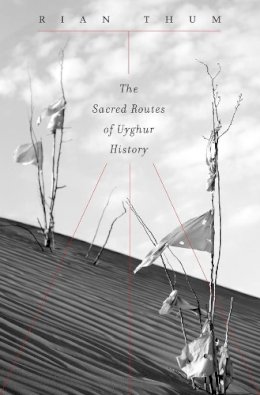
The Sacred Routes of Uyghur History
Rian Thum
For 250 years, the Turkic Muslims of Altishahr—the vast desert region to the northwest of Tibet—have led an uneasy existence under Chinese rule. Today they call themselves Uyghurs, and they have cultivated a sense of history and identity that challenges Beijing’s official national narrative. Rian Thum argues that the roots of this history run deeper than recent conflicts, to a time when manuscripts and pilgrimage dominated understandings of the past. Beyond broadening our knowledge of tensions between the Uyghurs and the Chinese government, this meditation on the very concept of history probes the limits of human interaction with the past.
Uyghur historical practice emerged from the circulation of books and people during the Qing Dynasty, when crowds of pilgrims listened to history readings at the tombs of Islamic saints. Over time, amid long journeys and moving rituals, at oasis markets and desert shrines, ordinary readers adapted community-authored manuscripts to their own needs. In the process they created a window into a forgotten Islam, shaped by the veneration of local saints.
Partly insulated from the rest of the Islamic world, the Uyghurs constructed a local history that is at once unique and assimilates elements of Semitic, Iranic, Turkic, and Indic traditions—the cultural imports of Silk Road travelers. Through both ethnographic and historical analysis, The Sacred Routes of Uyghur History offers a new understanding of Uyghur historical practices, detailing the remarkable means by which this people reckons with its past and confronts its nationalist aspirations in the present day.
Product Details
About Rian Thum
Reviews for The Sacred Routes of Uyghur History
Nile Green
Los Angeles Review of Books
A pioneering work. The Sacred Routes of Uyghur History explores the complex relationship between history production, social practice, and space, and traces the transformation of specific historical genres in response to changing political contexts and the increasing role of the state. By examining the development of manuscript culture and technology, it provides a new perspective on the study of the history of the region.
Ildikó Bellér-Hann, University of Copenhagen Thum’s brilliant depiction of historical practice in Altishahr—Chinese Central Asia—is nothing less than a new understanding of what history is, how it is practiced, and how it works. The Sacred Routes of Uyghur History shows how the interplay of shrine pilgrimage, tazkirah recitation, tomb graffiti, recombinant manuscripts, and later, printed biographies, reflected and constituted a historical community in Xinjiang that was not dynastic, religious, or national but still comprised a powerful and pervasive identity. This book should be read not only by specialists on China, Central Asia, and the Islamic world, but by all historians, for its insights into alternative but vital modes of historiography on the limes of Eurasian empire and the cusp of colonial modernity.
James A. Millward, Georgetown University
